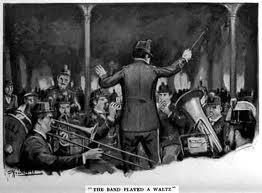
[This is taken from Routledge's Manual of Etiquette.]
Twenty years ago, the Valse (or, as it was then pronounced, Waltz) was a stately measure, danced with gravity and deliberation. Each couple wheeled round and round with dignified composure, never interrupting the monotony of the dance by any movements forward or backward. They consequently soon became giddy, although the music was not played above half as fast as the valse music of our day. We are bound to admit that this stately fashion of waltzing was infinitely more graceful than the style which has superseded it. But, having confessed so much, we may venture to add that the Valse, as danced by the present generation, possesses a spirit, lightness, and variety quite unknown to its stately predecessor.
The old Waltz was introduced into this country from Germany, where it has always been the favourite dance of the people in all ranks and conditions. But, although we adopted the step of their national waltz, we so entirely altered the time, that it became in our hands a totally different dance, which the Germans themselves would have found it difficult to recognize. At that period, “fast dancing” was unknown in England, and would have been regarded as highly indecorous.
At its first introduction, the Waltz was received with great mistrust by the older portion of the community. If it was to be tolerated at all in correct society, it must at least be danced in a deliberate manner, consonant with the dignity of the English character. It was, therefore, taken at half its original temps; it ceased to be the giddy, intoxicating whirl in which the Germans delight, and subsided into the comparatively insipid and spiritless affair known thirty years ago as the “German Waltz.”
We have already seen how complete was the revolution effected by the Polka in these old-fashioned ideas. But, although we cannot regret the introduction of a more animated style of dancing, we are sorry that the old Waltz has been so entirely given up. When restored to its original temps, the Valse a Trois Temps is nearly as spirited as the Valse a Deux; and twice as graceful. It has the additional advantage over the latter, that it contains in each bar three steps to three beats of the time; whereas the Deux Temps, as its name implies, numbers only two steps in a bar of three notes; and is thus incorrect in time. We venture to predict that the old Waltz will, at no distant day, be restored to public favour. We shall be heartily glad to welcome it once more, but on the condition that it shall be danced in the only manner which does justice to all its attractions; that is, as it is danced by the German peasants under the wide-spreading oaks of its own fatherland. We proceed to describe the step for the gentleman: the same, beginning with right foot instead of left, will apply to the lady.
Gentleman takes his partner round the waist with his right arm; his left hand holds hers, as in the Polka. Lady places left hand on his shoulder, and right hand in his left hand. Begin at once with the figure en tournant. Time ¾; one step to each beat. First beat in each bar should be slightly marked by the dancers.
1st beat.—Slide left foot backwards, towards the left.
2nd beat.—Slide your right foot past your left in same direction, keeping right foot behind left, and turning slightly to the right.
3rd beat.—Bring left foot up behind right (one bar).
1st beat.—Slide right foot forward towards the right.
2nd beat.—Slide left foot forward, still turning towards right.
3rd beat.—Bring right foot up to right, turning on both feet, so as to complete the circle (two bars). Remember to finish with right foot in front. Repeat from first beat of first bar. Gentleman always turns from left to right; lady from right to left.
The step of the old Waltz is simple enough; nevertheless some practice is required to dance it really well. Remember always to slide, not to step, forward; for the beauty of this valse consists in its gliding motion. It is not at first easy to dance swiftly and quietly at the same time; but a little patience will soon enable you to conquer that difficulty, and to do full justice to what is, in our opinion, the most perfectly graceful of all the round dances, without a single exception.
Copyright © D. J.McAdam· All Rights Reserved